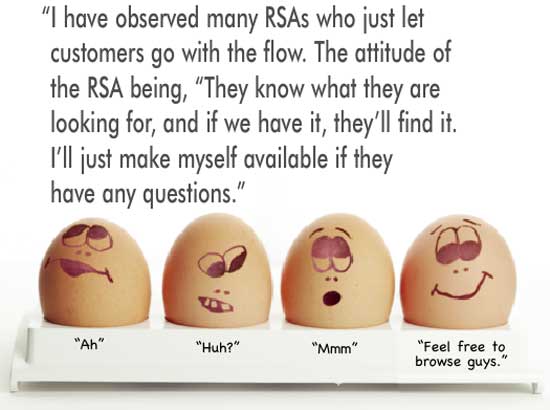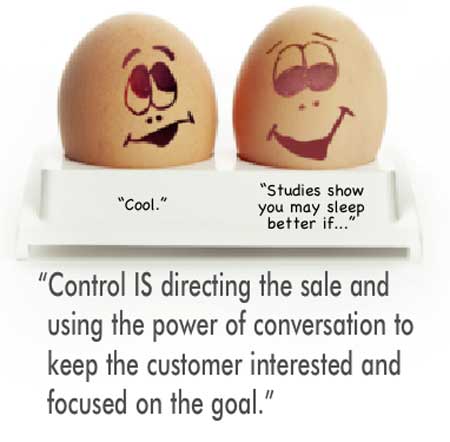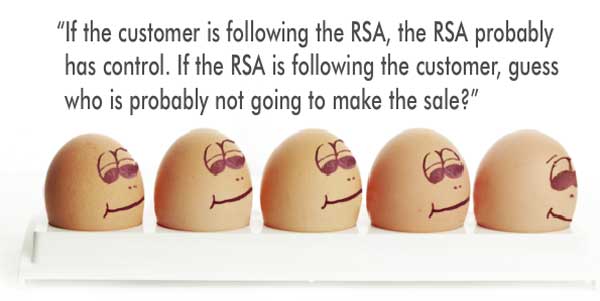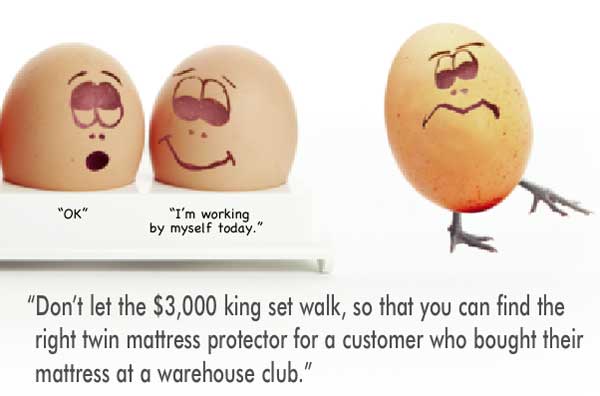When you feel sick, you usually go to see your doctor. What would you think if your doctor said to you, “Welcome to our clinic. We have treatments available for a variety of ailments and diseases. Some of them are on sale. Why don’t you browse through this medical journal and find one that you like. I’ll be in the next room if you have any questions.”
Does this sound completely ridiculous?
Then, why is it not considered ridiculous when the Retail Sales Associate (RSA) in a bedding department says essentially the same thing to a customer? Just as the physician knows the ailments, the treatments and the cures, the RSA should know all the beds, their feels (comfort levels) and their prices. Just as the patient only knows his symptoms, but little else, the customer usually only knows his problems (symptoms) and little else. To think that the customer can just browse around until he “finds one he likes,” is just as silly as the doctor/patient scenario we described in the first paragraph.

THE ENCOUNTER WITH THE BEDDING CUSTOMER
The opening act of each retail sales drama starts pretty much the same way. Customers walk into a store and RSA’s greet them with the hope of making a sale.
At once, this encounter between two human beings, who are probably total strangers, becomes a contest for control of the ensuing interaction. We’ll call this interaction The Sale.
The final outcome of The Sale will depend almost entirely on whether the RSA keeps control or gives up control to the customer.
There is an old saying in retail, “Somebody gets sold in every sales encounter. It’s either the customer or the salesperson.” Guess what happens when the salesperson got sold? If you guessed that the customer leaves empty handed, you guessed correctly. When a customer leaves empty handed, the salesperson, at some point, probably relinquished control of the sale. When this happens, nobody wins and everybody loses.
WHAT DO WE MEAN BY CONTROL OF THE BEDDING SALE?
What is control, anyway? The first entry in the Oxford English Dictionary defines control as: “the function of directing and focusing action.” Shouldn’t this be the RSA’s role in the sale?
In his Furniture World article, “Social Media,” January/February 2014, Volume 144 No. 1, page 75, Larry Mullins says, “The power of the one-on-one conversation remains the most effective method of selling on earth.” Ask yourself, have you ever noticed much of a one-on-one conversation when the customer is wandering around the store unattended with the RSA standing alone, watching at a distance, waiting and hoping that the customer will have a question?
Control of the sale IS NOT pushing, dominating, browbeating, high-pressuring or out-talking the customer. Control IS directing the sale and using the power of the conversation to keep the customer interested and focused on the goal. The goal is to make the sale and solve the customer’s problem. To reach the goal the RSA must learn about, analyze, and understand the customer’s problem. That’s why he or she is in your store to begin with, to try to solve a problem.
If control is so important, how and when does the RSA gain and hold onto control of the sales encounter? What does the RSA do if he loses control, or cannot gain control to begin with? We’ll discuss these questions in the following paragraphs.

FIRST, PREPARE THE RSA FOR THE SALES ENCOUNTER
Before we begin analyzing the process of establishing control of the sale, we must emphasize that no RSA can control any one-on-one conversation unless he or she is PREPARED for his/her role on the sales floor. Like an actor in a play, or our doctor mentioned above, the RSA must be trained and prepared for her role. This does not mean that the RSA has to memorize a script.
This leads to our next RSA qualification, and that is confidence. To control the sale, the RSA must have confidence in himself and his products. That brings us back to preparation again, doesn’t it? Being thoroughly prepared is the only way to feel confident and to project that confidence to the customer. Confidence is contagious. The confident RSA will pass that confidence on to customers and confident customers are much more likely to make a purchase and feel good about their purchase.

WHY SHOULD THE RSA TRY TO CONTROL THE SALE?
I have observed many RSAs who just let customers “go with the flow”. The attitude of the RSA being, “They know what they are looking for, and if we have it, they’ll find it. I’ll just make myself available if they have any questions.”
Let me say this. Many, if not most, customers DO NOT KNOW what they are looking for. As we said in a previous paragraph, the reason they walk in the door to begin with is because they have some sort of problem. The sole purpose of the RSA is to help solve that problem. The RSA who does not take control of the sale with the purpose of solving the customer’s problem, will lose the sale to an RSA down the street who will take control and solve the problem.
HOW AND WHEN DOES THE RSA GAIN CONTROL?
Okay, now we have a prepared RSA ready to take an “up”. He’s also confident in himself and his products because he is prepared. Do you think the prepared, confident RSA is going to just lay back and let the customer find everything for himself and just answer a question when needed? I don’t think so. So, where does this prepared RSA begin to establish control?
Control begins with the greeting: If you are a reader of sales training books and articles, you may have noticed that “The Meet and Greet” is widely debated and discussed. Heated arguments among sales trainers voice a variety of opinions on what constitutes a “Good Greeting.” This is not an article about the Meet and Greet; it is about establishing Control of the Sale, but let me make one important declaration. The point of a strong, interesting greeting is to quickly gain control of the sale. The big problem with “May I help you?” or “How can I help you?” or “Welcome to our store!” is that none of these greetings grabs the customer’s attention and focuses that attention on the RSA. Therefore, they do not help the RSA gain control of the sale. First and foremost, the greeting should make the customer feel comfortable with the store and interested in what the RSA has to say. When the customer feels at ease, the RSA has a much better chance to gain control of the conversation. What is a good greeting? That will be the subject of a future article. So, where does the RSA go from here?
Qualify to keep control: Qualifying, which is asking the customer questions to find out exactly the nature of his sleep problem, should really solidify the RSA’s control of the sale. Qualifying not only analyzes the customer’s problem, it also provides the opportunity for the RSA to establish a rapport with the customer. The concerned, skilled RSA who carefully probes the customer’s wants and needs should build the customer’s confidence in the RSA as someone who really is qualified to help them. Once a genuine rapport is established, maintaining control should get a lot easier.
Selection to keep control: The Selection step is where the RSA’s preparation and product knowledge really start to pay off. If a store is correctly merchandised with a full array of products, the skilled RSA should quickly be able to find the right product for the customer at the right price. Using the answers obtained in the Qualifying step, the RSA now must plan and follow a route through the store whereby he will LEAD the customer to the right product. But, the Selection step can also be dangerous. This is a critical juncture in the sale where customers can start wandering away from the RSA. This is where your hard-earned control can suddenly evaporate, and when it does, so does your hope of making the sale. It’s very important to keep customers engaged. This is where RSA preparation can really come in handy. This is where presenting timely educational facts to hold the attention of customers is important.

You will know the Selection step has succeeded when the customer discovers the bed or product she really likes and is willing and/or eager to buy. I like to call this discovery event: LANDING on the bed.
Control at the close: When they are Landed, go for the close. Closing is a process. This closing process includes Pitching the bed, which also can be called the Presentation. At this point, hopefully, the RSA has the customers or customer lying on the bed, in rapt attention, as he reaffirms their intelligent decision with the benefits of the bed, supported by features. At this point, control of the process should come naturally, but it can still be lost if the RSA is not careful. Watch out for the dreaded control-killer, “Is this the one you want or do you want to look around some more?”
As we all should know, the sale does not end with the close. Prepare the happy customer to become a satisfied, repeat customer for many years to come. Control, by this time, should be easy. Your customer is happy, the RSA is happy. Now is the best time to ask confidently for referrals and future sales. Get some idea of the customer’s future needs and wants. Let him know that you will be his scout and consultant for all future furniture and bedding purchases; and you will faithfully follow up. All you need is contact information, such as e-mail address, etc.
LOSING CONTROL OF THE SALE: WARNING SIGNS
How can you tell if an RSA has gained or lost control of the sale? Observe who is following who. If the customer is following the RSA, the RSA probably has control. If the RSA is following the customer, guess who is probably not going to make the sale.
Keeping control of the sales process is not always as easy as this article makes it sound. There are many pitfalls between the Meet and Greet and the final happy Goodbye when the thrilled customer, receipt in hand, exits the store waving happily at the confident, triumphant RSA.
What could possibly go wrong? We have a supremely prepared RSA with a pleasant, engaging personality and he still can’t gain and keep control of the sale?
The answer is almost always, The Customer Can’t or Won’t Pay Attention to the RSA. Why?
Illustrated here are a few problem scenarios.
The Couple. Most RSAs will agree that couples, especially those in the 25 to 54 age bracket, are your favorite customers. As mentioned previously, the RSA must keep the conversation interesting to hold customers’ attention. However, couples can also be harder to control than single customers. If one half of the couple is interested, but the other is not paying close attention, and starts wandering around, the next thing you know, he or she calling out across the room, “Honey, come look at this one!” This is where your hard-earned control can suddenly evaporate, and when it does, so does your hope of making the sale. It’s very important to keep your couple together; keep both of them engaged.
If one half of the couple starts wandering off, the RSA MUST, tactfully and gently, pull him or her back into the sales presentation.
Couples with Young Children. Why do people bring small children to look at mattresses and furniture? For whatever reason, if they do, the RSA must patiently bear this burden and try to maintain control (of himself and the sales process.) Regardless of what these customers are looking for, parents are easily distracted by their children, especially unruly ones. Sadly, the only suggestion I can offer is for the store to set up a small “children’s entertainment room” with TV and games, where the parents can easily keep an eye on them. You certainly don’t want to try to correct unruly and misbehaving children. Parents quickly take offense. If the parents are looking for children’s beds, the best way to hold their attention, is to emphasize the importance of proper sleep for children. Be armed with the facts concerning sleep and children’s health, and make these facts part of the conversation. Concerned parents are usually a good audience for the appeal to the health of their children. If they insist on cheap, however, find cheap, write it up and get them out of the store as quickly as possible.

I want to make a quick point about mattresses and furniture for very young children. Please, encourage the parent, and not the three year old, to make the buying decision. We’ve all seen the spectacle of the parents “begging the baby” to decide which one it likes the best. Watch your control vanish when this happens.
How do you, the RSA, know if you are keeping or losing control? Pay attention to the customer’s “attention status.” Is he showing “buying signals” or “boring signals?” If he yawns and/or asks for your card, he’s bored. You’ve got to re-gain control, quickly, or you’ve wasted the entire encounter.
Multiple Customers: If you work in a small store, particularly in a small mattress store, you may be the only RSA on the floor. What happens when several customers come in at once or when the “be-back bus” stops in front of the store and lets off three or four people? It’s hard enough to control one sales conversation, much less four or five. You still have to keep control, as best you can. Here’s what I suggest. You must greet and quickly qualify EVERY customer. Do not ignore anyone. Explain in a voice that all can hear that you are working by yourself and you will help everybody and you will make it worth their while to be patient. Once you qualify each customer, then you must PRIORITIZE the customers by their potential. Don’t let the $3,000 king set walk, so that you can find the right twin mattress protector for a customer who bought their mattress at a warehouse club.
RE-GAINING CONTROL OF THE BEDDING SALE
Even the most prepared RSA will, once in a while, run into a tough customer that refuses to be controlled. What do you do with this person? One method I have used to good effect on occasion is to change the subject altogether; to look for common ground. Weather, sports, politics (be careful with this one,) cars, pickups and grand-children are all subjects (among many others) that can spark interest in even the most taciturn customer. GET THEM TALKING is often your best tool to gain control, if all else fails. Talking (and agreeing) about anything, to establish rapport, has been known to turn the most aloof up into a satisfied long-term customer. Which brings us to our next idea.
Keep them in the store. I noticed many years ago that the longer a customer stays in the store, (especially the one that cannot seem to make a decision), the more likely it is that she will eventually decide to buy. The customer who is not under control (not in the conversation) will usually walk out early and unsold.
Let them talk it over. Sometimes the customer (especially couples) will ask the RSA if they can talk over the possible purchase privately (this usually happens when they are lying on the bed.) Always honor this request. Moving away and letting them talk does not mean losing control of the sale. You must keep an eye on them, however, and be prepared to break in on their conversation at the first utterance of the dreaded, “Should we look around some more?” If you have maintained strong control of the sale up to the point of letting them talk privately, you should not have any trouble in moving right back in and re-assuming the initiative and control.
Turn the sale over to another RSA. What if you just cannot gain control of the sale? If another RSA or manager is working, turn the sale over to them. Sometimes a Turn-Over (T.O.) works wonders. There is a correct, effective way to do a turn-over for maximum effect. There is a whole chapter in my book, How to Win the Battle for Mattress Sales, the Bed Seller’s Manual, for full details on the T.O.
IN SUMMARY
Control of The Sale is the single most important facet of the sales process the RSA can exercise. Failure to control the sale, usually signaled by the RSA haplessly following a customer around the store, is the single most fatal error an RSA can make. When your salespeople control the sale, your customer wins, you win, your store wins, the manufacturer wins, and for that matter, so does the Gross Domestic Product for the U.S.A.